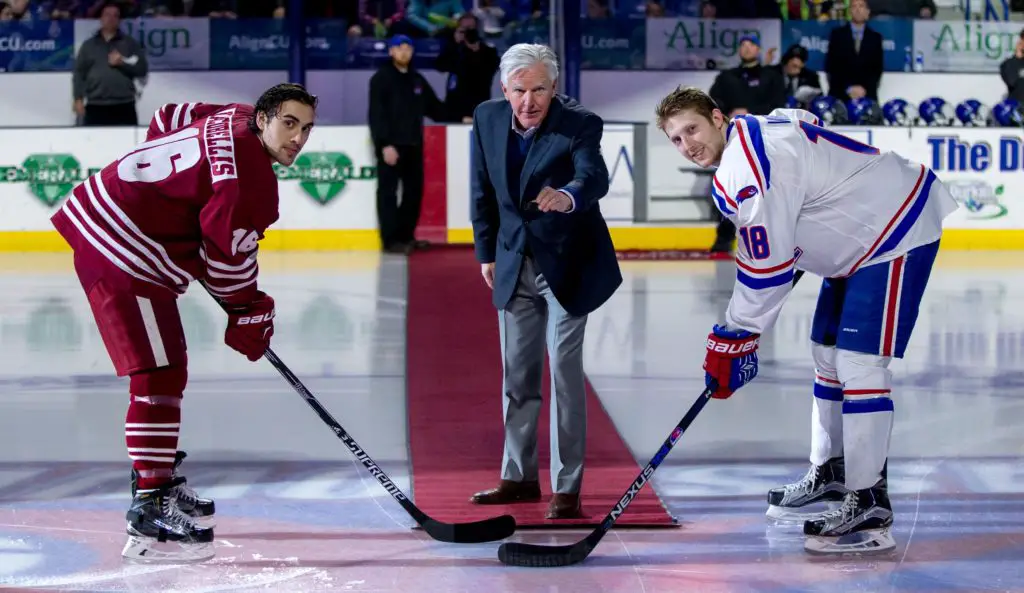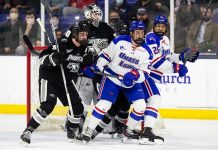
In the summer of 2007, when Marty Meehan put aside his 14-year career as a United States congressman to return to his alma mater, UMass Lowell, as its chancellor, there were a number of uphill battles he faced.
Certainly, academics and raising the state school’s national ranking, SAT scores for incoming freshmen and graduation rates were all major goals.
But he arrived in what was a very strange time for the UMass Lowell hockey team. A number of trustees, led by board chairman Stephen Tocco, had formed a committee to explore eliminating one of the state’s two Division I men’s hockey programs.
Though UMass Lowell had deeper routes in hockey having won three Division II national tournaments and being a founding member of Hockey East with three NCAA Division I tournament appearances, their sister school 79 miles west in Amherst was coming off its first-ever NCAA tournament appearance. The thought at the time was to leave the larger campus with its hockey program and dissolve the program in Lowell.
Meehan wasn’t having it.
“Trustees wanted to eliminate the Lowell [hockey] program and just have a hockey team at Amherst,” said Meehan, who now serves as the president of the entire University of Massachusetts system. “It was almost as if you can’t have two great hockey teams. I rejected that right from the get-go.”
Fast forward more than a decade later and Meehan’s vision was correct. UMass Lowell has won three Hockey East titles since 2013 and UMass is coming off an appearance in the national title game.
The two schools meet in a home-and-home series this weekend beginning Friday night in Lowell. Both teams are ranked in the top 15 in each national poll and this will be a critical series for positioning in Hockey East as well as helping improve respective resumes for the NCAA tournament.
“Both of these programs are important to me,” said Meehan. “The Lowell program has done great not just reaching the Frozen Four and winning Hockey East, the River Hawks have led Hockey East in attendance three of the last four season and have averaged over 5,000 at the Tsongas Center three of the last five seasons. That makes the program work.
“When I got the job as president of the system, Ryan Bamford was a new athletic director at Amherst. I told him, ‘I expect you to build a hockey program at UMass Amherst that we can all be proud of.’
“Ryan Bamford did a great job. He had a search for a new coach and he got one of the best available in the country. That was critical at UMass Lowell, the opportunity to hire a world-class coach. Ryan did a great job in terms of hiring a new coach (Greg Carvel) in Amherst.
“Each program has created a lot of excitement on both campuses. And the dual success of the two programs has added to the excitement.”
As chancellor at Lowell and now president of the UMass system, Meehan has been a strong supporter of hockey and athletics in general. He sees a correlation of success on the field, ice and court translating to success in attracting top academic candidates.
“Athletics are the front porch of any university,” Meehan said. “If you’re going to have an athletic program, you’ve got to have a great athletic program. There are a lot of benefits on the academic side of an institution if you have a really solid athletic program.
“The economics of an athletic program are important, so I think the athletic programs at any university need to the maximized to be a benefit.”
Economics are something that Meehan pays careful attention to.
He can be seen at hockey games on both campuses walking around, observing the lines at concession stands, trying to understand what type of revenues these venues generate. He says repeatedly that he isn’t a micro-manager, but his basis of knowledge of the business involved certainly piques his interest.
“I look at the attendance, the revenue that is generated from attendance, from food and beverage,” Meehas says. “I pay attention, I walk around both arenas to see if there are lines for food and beverage and want to know that’s maximized.”
That financial success helps Meehan justify spending on the programs.
When he arrived at Lowell, he said, the head coaching position was the lowest-paying in Hockey East. Since hiring Norm Bazin and continually renegotiating his salary in accordance to success, the job is now one of the top-paying in the league.
Similarly, when Greg Carvel was hired in Amherst, the salary was increased by close to $100,000 over his predecessor John Micheletto.
That, Meehan feels, is justified by success.
“If you get a coach that sells out hockey games, its generates revenue, [and] that justifies that coach’s salaries,” Meehan said. “If you’re going to play in Hockey East, you’ve got to compete. I’ve been competing with graduates of other universities in Hockey East – BC, BU and others – my whole life professionally. That’s what our graduates are expected to do – compete. They compete with UVM and UNH grads every day.
“If we’re going to play on the hockey rink with the other schools, we’re going to compete. UMass is a globally-ranked university, so we’re going to compete in everything we do. I demand excellence in everything we do.”
While making sure UMass invests in their two Division I hockey programs, Meehan acknowledges that having the right head coach on each campus is what drives success. He was heavily involved in the search process that brought Bazin to Lowell. And though he didn’t have his hand involved when Bamford hired Greg Carvel four years ago, he is highly confident that it was easily the best hire of the candidates available.
“I believe that leadership in any organization, whether it’s running a university, running a company, or, frankly hiring a congressional staff, you have to hire the best people you can get,” Meehan said. “That’s what makes great universities. These two coaches are extraordinary individuals.
“It’s important to hire a great provost, great deans. But if you want to compete in athletics, you have to hire the best coaches you can get.”
While at Lowell, Meehan was a major catalyst behind the school’s push to elevate its entire athletic program to Division I. While hockey has played at the Division I level since 1984, the university itself only became a full-fledged Division I member in July 2013.
Now competing at college athletics top level in all sports, the sister schools face one another in 16 different men’s and women’s sports. There now is a season-long trophy to play for as well, the Kennedy Cup, of which both men’s hockey games this weekend will count towards the standings.
Currently, UMass holds a 5-3-1 advantage in the 17-event series. UMass Lowell captured the inaugural Kennedy Cup, 8-6, over their rivals from Amherst.
Meehan says he is excited to be in attendance both nights this weekend when the Battle for the Bay State, the Commonwealth Cup or whatever moniker you might want to give this rivalry goes down. Despite being a UMass Lowell alum, he admits his allegiances on the weekend with be split.
“When I got this job [as UMass president], people asked who are you going to root for when UMass Amherst plays UMass Lowell, and vice versa,” said Meehan. “That’s simple for me. If the game’s at Lowell, I’ll root for Lowell. If the game’s at Amherst, I’m going to root for Amherst.
“I want both UMass teams to do well.”


